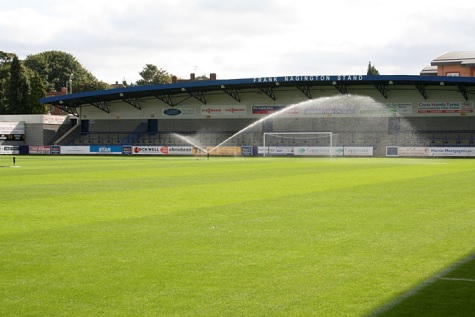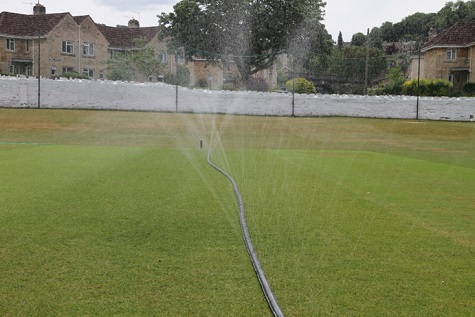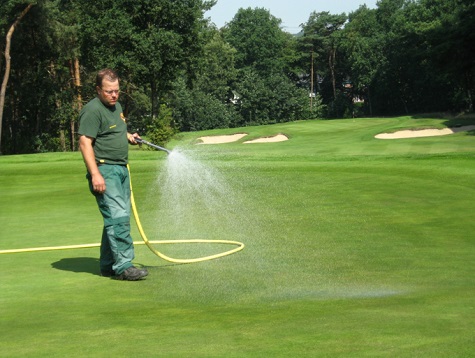The current spell of hot, dry weather is providing a challenge for many turf professionals up and down the country, especially now we are seeing a number of water restrictions and bans being put into place.
South East Water has just last week (26th June) introduced a hosepipe and sprinkler ban in Kent and Sussex.
The BBC’s report on the situation says the water company imposed the ban after supply issues left around 4,000 customers without water. Others were experiencing low water pressure, in areas including Wadhurst, Mayfield, Biddenden and Staplehurst.

There are also a bans across Cornwall and in parts of Devon, including the Colliford and Roadford areas.
The BBC go on to say that other water companies are monitoring water levels closely, “although no hosepipe bans are currently planned in other parts of England”. There are no bans in place in Scotland, Wales and Northern Ireland.
The report quoted the Environment Agency who said bans have been put in place because hot weather affects how quickly water storage reservoirs can be refilled. It said there is no threat of a drought in the UK at present.
Here is some helpful information for our turf professional readers - during a hosepipe ban water cannot be used for the following:
- Watering a garden using a hosepipe
- Cleaning a private motor-vehicle (or a trailer for such a vehicle) using a hosepipe
- Watering plants on domestic or other non-commercial premises using a hosepipe
- Cleaning a private leisure boat using a hosepipe
- Filling or maintaining a domestic swimming or paddling pool
- Drawing water, using a hosepipe, for domestic recreational use
- Filling or maintaining a domestic pond (manmade or natural) using a hosepipe
- Filling or maintaining an ornamental fountain (including a cascade or any other display of moving water, and includes filling by permanent plumbing)
- Cleaning walls, or windows, of domestic premises, using a hosepipe
- Cleaning paths or patios using a hosepipe
- Cleaning other artificial outdoor surfaces using a hosepipe
South East Water adds that its customers can water a lawn that has been laid within the last 28 days – you just need to ensure you water it outside of ‘peak hours’ (8am to 10am, then 5pm to 9pm).

It states, "You may use a hosepipe to water newly laid turf in domestic gardens for 28 days after planting/laying in order to help them establish.
‘In order to do so you must be able to provide evidence of that date on which the gardening work was completed. Failure to do so and watering for longer than 28 days will be considered a breach of the conditions of the temporary use ban."
People can still water their gardens using a bucket of water, or using a watering can.
Garden ponds can be filled purely for the safety of fish or aquatic animals that live in the pond.
The aim of the bans is to conserve water. It’s worth noting, though, that these exemptions may differ slightly depending on your local area. There are more specifics to consider for farms, allotments, parks, schools, businesses, etc, too.
Ultimately, it’s up to you to check your local water supplier’s rules and follow them.

As for conserving water, here are a few tips for turf professionals:-
- Monitor and adjust irrigation scheduling to suit the requirements of your facility. Regularly inspect your sports pitches for leaks, broken sprinklers, or other issues that may result in water wastage. Address these problems promptly to minimise water loss.
- Conduct a water audit in terms of calibrating your sprinklers output and accuracy.
- Regularly monitor weather conditions, evapotranspiration rates, and soil moisture levels to determine the actual water requirements of your sports pitches. Adjust your irrigation schedule accordingly to avoid overwatering.
- Install efficient irrigation systems such as weather-based controllers, soil moisture sensors, and drip irrigation. These systems can provide precise and targeted watering, reducing water waste.
- Water deeply and infrequently to encourage deep root growth and reduce the need for frequent irrigation. Avoid watering during windy conditions to minimise water evaporation.
- Keep the playing surface in good condition by regularly aerating, dethatching, and top-dressing the turf. This allows water to penetrate the soil effectively, reducing runoff and promoting better water absorption.
- Choose grass species and varieties that are more resistant to drought conditions. These grasses require less water and are better suited for sports pitches in arid or water-scarce regions.
- Consult with landscape and irrigation professionals who specialise in sports turf management. They can provide tailored advice and assist in implementing water-saving strategies.
- Consider the installation of a bore hole if the site is suitable for one, they are an effective means of acquiring additional water supplies to your facility.